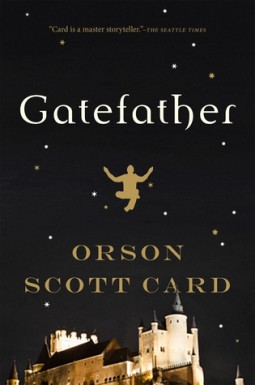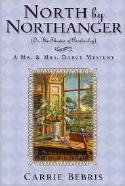This review contains affiliate links, which earn me a small commission when you click and purchase, at no extra cost to you. Thank you for supporting my small business and allowing me to continue providing you a reliable resource for clean book ratings.
Orson Scott Card concludes his trilogy of the Mithermages in Gatefather. He explained in an afterword in the first book, The Lost Gate, that he had come up with some basic ideas of the story and the mage world in 1977 and just recently came to put some pieces together and build books from the map he had drawn at that time. As the series has progressed and now concluded, it’s interesting to note how Card worked through the process of picking a narrative arc and sticking with it. He could have taken any number of paths and even written several more books exploring the world and going into plenty of detail about the power-hungry Families and what kinds of havoc they could wreak given the opportunity.
In the end, though, he focused primarily on Danny North, a teen boy who grew up in the Family of mages in rural Virginia who had descended from the Norse “gods.” He eventually realized he was a gatemage, someone who could build gates to travel anywhere instantaneously, including to another planet, Westil, where the Gate Thief, or Loki, had been trying to keep gatemages from building Great Gates between the planets to keep them safe from the evil possessing “spirit” Set, or the Belmage (or as Christians would call him, Satan).
Rather than exploit his tremendous power and play into the hands of his Family or other mage Families from around the world, Danny always sought to figure out how to make things better and try to save both worlds from Set. This book continues the intrigue and political maneuvering of some characters who may or may not be trusted, including Loki, or Wad, on Westil and the two powerful women he deals with there, but it also delves quite a bit into a philosophy of sorts explaining how mages get their power and where all souls come from and return to after life. It may be tiresome for some readers, but I found it thought-provoking.
Rated: Moderate, for occasional moderate language, some brief episodes of violence, and a fair amount of crude sexual references. The main character is a teen boy, who has a group of friends from school he uses to help him, and some of the teen girls seem to want to throw themselves at him pretty frequently, while the boys can be crude as well. The ultimate villain, Set, seems pretty focused on sex. It uses sex to enter a character’s body and then “thinks” about sex almost all the time. It may or may not be an accurate description of the base ways that a disembodied evil “person” would see mortals as being focused on, or a simple tool it could use to manipulate them, but it got old for me.




